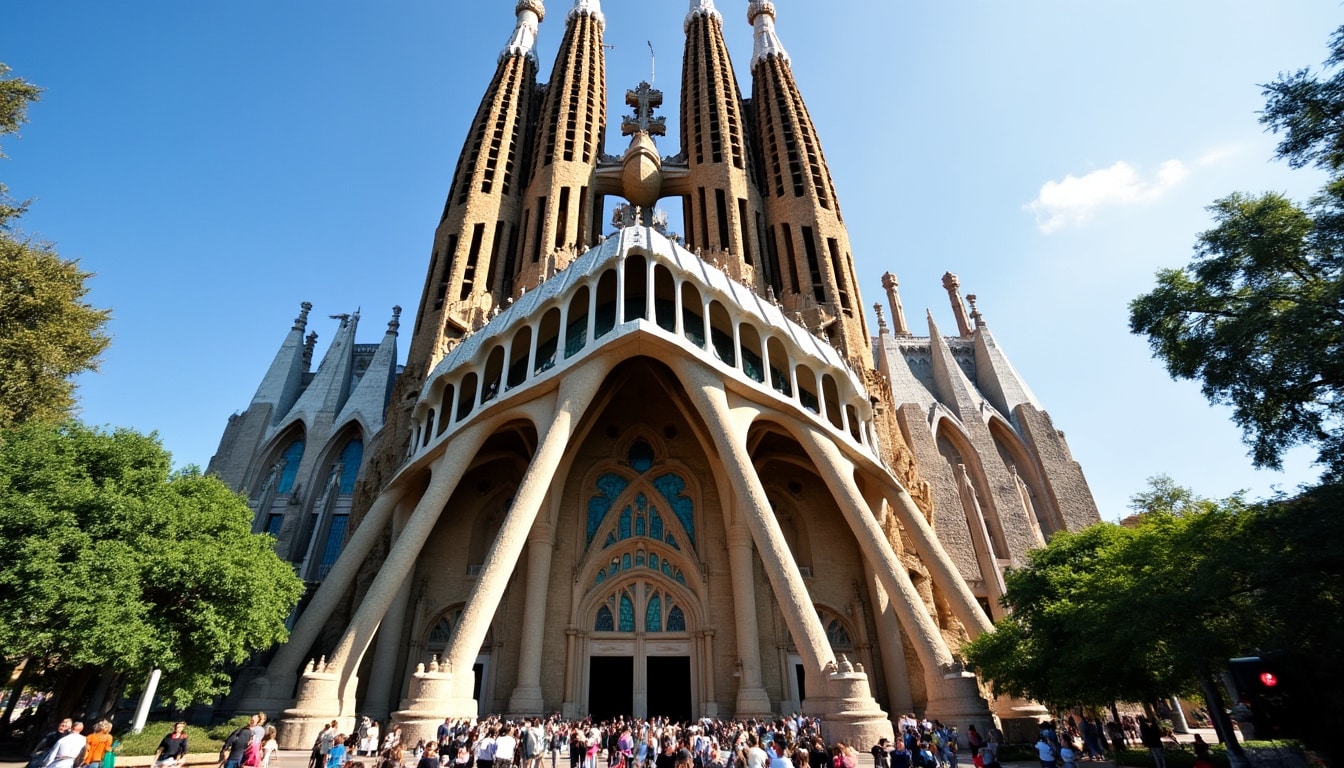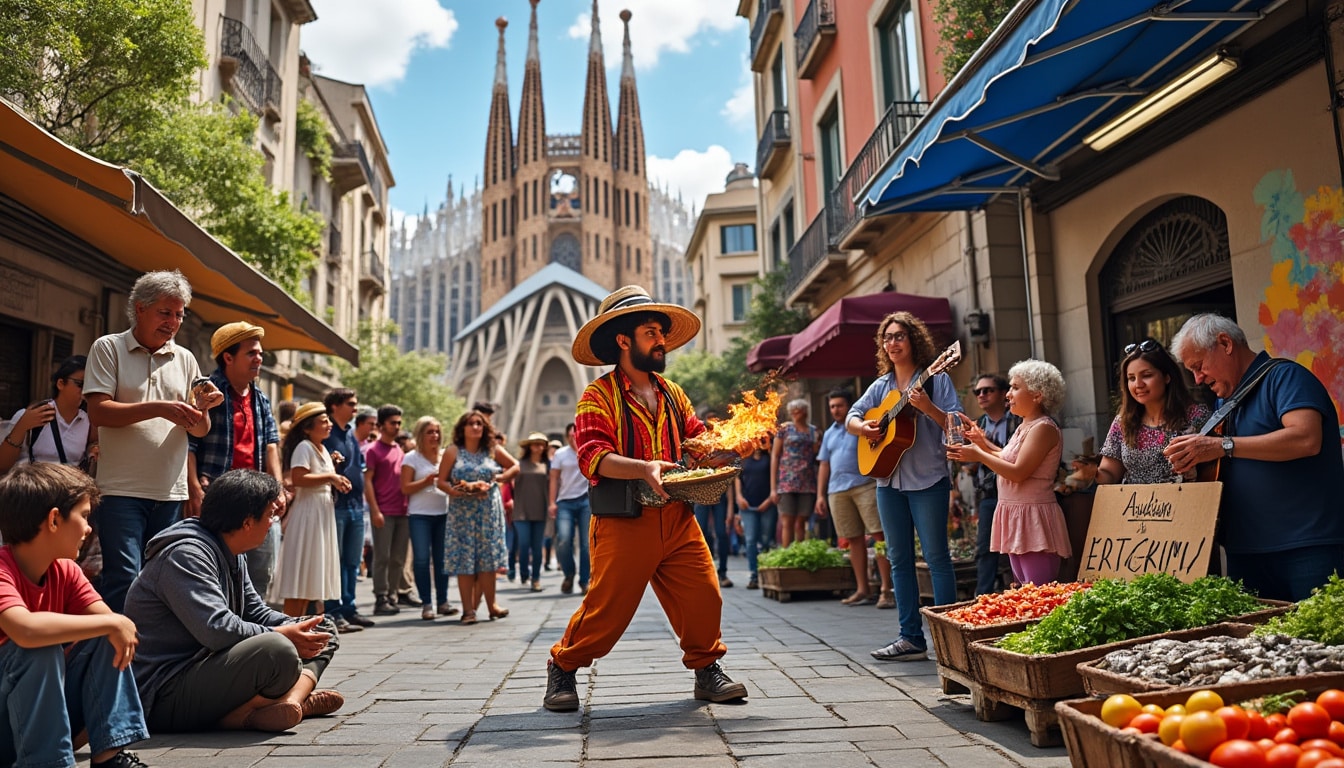Barcelona, a city of sunlit vibrancy and architectural wonders, boasts surprises at every corner. While many recognize it for its stunning landscapes and rich cultural tapestry, lesser-known truths lie just below the surface. This city, known as a cosmopolitan hub, offers captivating stories woven into its urban fabric, extending beyond its reputation as a tourist favorite. From quirks in its historical timeline to current societal challenges, Barcelona’s layers hold tales as diverse as its architecture—a picture of dynamism and contrast. This cultural jewel not only shines with its scenic beauty and lively arts but also presents complexities typical of contemporary urban life. Prepare to uncover some unusual facts, alongside navigating the social issues that shape the essence of this remarkable metropolis.
Unveiling Barcelona’s Hidden Historical Gems
The historical tapestry of Barcelona stretches back further than many might imagine. Although usually associated with the grandeur of Antoni Gaudí’s architectural offerings, the city hides layers that are older than its mythic beginnings. Did you know that the area was referred to as “Barcino” by its early settlers? This name is believed to have originated from Hamilcar Barca, a Carthaginian general who saw strategic value in the region.Although over time the city embraced its Roman influences, some legends claim that its roots precede Rome’s founding itself, with stories of Hercules’ voyage lending mystical threads to its history.
Adding to these tales, the city’s transformation into a cultural powerhouse took a pivotal turn in the late 20th century. Up until the 1992 Olympics, Barcelona was devoid of the sandy beaches it is so famous for today. The seaside was industrial, a landscape redefined to enhance tourism attraction—a testament to the city’s resilient adaptability. At that time, sand was imported from Egypt, turning the industrial coastline into what is now recognized as some of the best urban beaches according to travel reports.
Barcelona’s historical journey is not limited to its economic advancements. Unique structures were crafted, some even holding UNESCO World Heritage status, such as Casa Batlló and Park Güell. However, not all architectural endeavors received warm welcomes. Take Casa Milà, for instance, whose unconventional design stirred controversy among locals when first unveiled.
Did you know that artists like Picasso found their muse in this city? Picasso spent many years here, contributing significantly to modernist movements. His legacy lives on through the Picasso Museum, similarly enriching Barcelona’s cultural footprint. These layers of artistic heritage convey the city’s commitment to preserving culture and art, hallmarks of the Barcelona Heritage Conservation Society.

Barcelona’s Pre-Roman Era
The narrative of Barcelona’s history is marked by its pre-Roman civilization. Remnants of that era still exist today, like the ancient Barcino underneath modern-day stretches. These layers of history are preserved through museums dedicated to informing the public about the city’s prehistoric era. Visit places like the Museu d’Història de Barcelona for a full immersion into the past.
One common thread through these exhibits is the melding of myths with historical fact; the evolution of the city from its allegedly mythological origins to its Romanized formation reflects the seamless blending of fact and folklore that characterizes Barcelonian storytelling. This preservation of history snugly sits among the responsibilities held by the Barcelona Heritage Conservation Society, ensuring the past’s relevance and survival.
Diverse Culture and Language Landscape in Barcelona
Barcelona is a vibrant mosaic of cultures and languages, distinguishing it from many European cities. On any given day, this bustling metropolis echoes with the sound of Catalan as much as Spanish, reflecting its dual identity. Catalonia, the northeastern province to which Barcelona belongs, fiercely maintains this linguistic duality, symbolizing both historical and cultural independence.
It’s fascinating to note that Catalan holds an official status equal to Spanish, permeating public life, seen on street signs, restaurant menus, and daily interactions. This emphasis on preserving Catalan heritage is a broader cultural movement actively fostered by the Cultural Collaboration Barcelona, an initiative promoting cultural exchange and understanding.
Yet, the language scene is but one line in a multicultural tapestry woven with international threads. Historical waves of immigration have enriched Barcelona’s demographic tapestry, resulting in a diverse populace. An estimated one-third of current residents trace their origins to other Spanish regions or beyond—a testament to the city’s openness and adaptability.
One might wonder, how does the city maintain harmony amidst such diversity? The challenge involves balancing tradition with modernity, a dialogue between old standings and new influences. This balance supports cultural richness while helping the city retain its identity—a task challenging in a world leaning towards homogenization.
- 🏙️ Multilingual Society: Catalan and Spanish are harmoniously used, reflecting years of linguistic coexistence.
- 🌍 Diverse Residency: Over one-third of residents were not born in Catalonia, exemplifying inclusivity.
- 🎭 Rich Cultural Exchange: Events and festivals, such as La Mercè, celebrate cultural diversity.
Annual events like the Fiesta de La Mercè illustrate this embrace of diversity. Celebrated in honor of Barcelona’s patron, it showcases a festival of colors, parades, and traditions symbolizing the city’s inclusiveness and cultural pride. However, not all cultural elements are embraced everywhere—visitors might be surprised to learn that while flamenco embodies Spanish arts elsewhere, it’s less practiced in Barcelona, where the Sardana dance predominates.
Overall, Barcelona’s culture is both a celebration of its past and a continual evolution towards future inclusivity—a vibrant quilt crafted from historical threads and contemporary yarns.
Barcelona’s Social Issues: From Homelessness to Urban Sustainability
No city is without its challenges, and Barcelona, despite its sunny disposition, faces social concerns that echo broader global urban issues. At the forefront is homelessness—a visible symptom of deeper economic disparities. The *Barcelona Homeless Support Initiative* plays a crucial role, providing resources and advocacy for the homeless, working tirelessly to address root causes and offer sustainable solutions.
Over the years, rising costs of living have pushed affordability out of reach for many—a paradox for a city ranked highly in terms of tourism. Despite economic growth, issues like housing remain at the forefront. Organizations such as *Barcelona Activa* are pivotal not only in providing employment opportunities, reducing unemployment rates but also in promoting economic stability to counteract homelessness.
Sustainable urbanization is another key focus area. Initiatives under the umbrella of *Sustainable Urbanisation Barcelona* aim to address environmental impacts resulting from urban growth. By integrating green spaces and promoting ecological practices, these efforts seek to curate a livable urban environment for all. More green parks are being introduced each year, with current statistics revealing over 68 parks dedicated to enhancing city life quality.
- 🚶♀️ Housing Crisis: Increasing property prices contribute significantly to homelessness.
- 🧑💼 Employment Opportunities: *Barcelona Activa* supports economic inclusion through job creation.
- 🌲 Environmental Concerns: *Sustainable Urbanisation Barcelona* fosters ecological practices to ensure livability.
In confronting these issues, the city highlights the importance of community-driven solutions. From grassroots movements to government-backed initiatives, Barcelona’s proactive approach aims not only to curtail immediate problems but also to foster long-term communal resilience.
Pioneering Social Innovation
Barcelona shines as an exemplar of social innovation, utilizing creativity to tackle societal challenges. Initiatives like the *Barcelona Social Innovation Lab* foster collaboration among various stakeholders, encouraging the development and implementation of holistic solutions. These projects span across multiple domains—housing, employment, and environmental sustainability, harnessing technology to amplify outcomes.
A key bodysuit is the Barcelona LGTBI Center, championing inclusivity and support for the LGTBI community, further cementing the city’s reputation as a progress-oriented landscape. Through events and educational programs, the center fosters expression and acceptance, breaking down barriers and advocating for equal rights.
Preserving Barcelona’s Architectural and Natural Heritage
Barcelona is internationally celebrated for its architectural grandeur—its skyline a canvas dotted with historical edifices and modern constructions. Naturally, preserving this beauty forms a significant aspect of urban planning. Renowned for its UNESCO World Heritage Sites, the city’s commitment to protection is profound. Antoni Gaudí’s contributions, such as the La Sagrada Família, not only draw architectural aficionados but also symbolize the city’s artistic soul.
Park Güell, another masterpiece, demonstrates how urban spaces can serve dual purposes—delighting visitors while preserving art. Managed under initiatives by the Barcelona Heritage Conservation Society, these sites highlight the balance between tourism and authenticity.
The prevention of dilapidation extends beyond art to encompass natural landscapes, ensuring that urbanization does not outstrip nature’s bounty. Over 10% of the city’s surface is adorned with greenery, from peaceful plazas to sprawling parks—all aimed at enhancing livability.
- 📜 Historical Conservation: Gaudi’s works, among others, benefit from serious preservation efforts.
- 🌳 Green Spaces Initiatives: More than 68 parks contribute to the city’s green footprint.
- 🕌 Iconic Landmarks: Tourism balanced with conservation ensures sustainability.
Furthermore, the city’s focus on creating pedestrian-friendly environments means these spaces not only survive but thrive. The introduction of bike lanes and pedestrian areas underscores Barcelona’s commitment to accessible urban life.
Barcelona’s Unique Identity: An Overview of Social and Cultural Paradigms
Barcelona’s spirit is as vibrant as its murals, vividly illustrating its unique identity. Despite being entrenched in rich cultural traditions, the city is an evolving patchwork of the traditional and the contemporary, where vibrant social dynamics play out in daily life. This fusion can be witnessed in bustling neighborhoods, from the trendy streets of El Raval to the historic pathways of Ciutat Vella.
The dichotomy of preserving historical roots while embracing modernity manifests in every aspect of Barcelonian life, from debate over urban expansion to the celebration of diverse cultures. Festivals like La Mercè offer a window into the spectrum of city life, where history, art, and cultural expression converge.
Networks like the *Barcelona Refugee Support Network* illustrate the city’s compassionate heart, where community health and well-being gain priority. Meanwhile, fashion-forward spaces like *BCN Ethical Fashion* emerge, combining style with sustainability. The stories interwoven through these initiatives speak volumes of Barcelona’s dedication to preserving a humane and equitable society.
- 👟 Cultural Vibrancy: Diverse festivals and urban arts embody Barcelona’s spirit.
- 💡 Social Innovation: Initiatives supporting urban and social cohesion.
- 🌿 Fashion with Purpose: Promoting ethically conscious styles in line with sustainable goals.
The resilience and ingenuity shared among Barcelona’s residents resonate through these actions. Understanding these facets provides insight into the city’s present-day challenges, dreams, and aspirations, fostering an appreciation for both its charm and complexity.
Barcelona’s Global Reputation
Internationally recognized as both a tourist haven and cultural muse, Barcelona’s global image is multifaceted. From iconic sporting events held at Camp Nou, home to the legendary FC Barcelona, to international debates about urban innovation, the city remains on the world stage. The city’s tourism allure, however, is balanced with caution—efforts aimed at sustainable visitor levels and preserving authenticity remain paramount.
The thriving Barcelona Tourism industry continues to highlight cultural treasures while navigating sustainability. Many neighborhoods actively implement strategies to ensure that commercial overreach does not undermine the city’s rich heritage—a challenging task well received by both locals and international audiences.
It’s this precise equity between preservation and progression that cements Barcelona’s status as a global icon of culture and history, where travelers converge not only to witness its beauty but to participate in its rhythm.
Frequently Asked Questions about Barcelona
- What makes Barcelona a unique travel destination? 📍
Barcelona combines stunning architecture, rich culture, and a Mediterranean vibe, offering a tapestry of experiences. Whether it’s the artistry of Gaudí or vibrant festivals, the city captivates with its diverse offerings.
- How does Barcelona address social issues? 🏠
Barcelona tackles social concerns through initiatives like the *Barcelona Homeless Support Initiative* and *Sustainable Urbanisation Barcelona*, focusing on housing, employment, and sustainability to uplift community welfare.
- Why is Catalan important in Barcelona? 🗣️
Catalan is a key aspect of Barcelona’s identity, representing its historical and cultural heritage distinct from Spain’s broader linguistic landscape. It remains an official language, integral to the city’s multicultural tapestry.
- Are there any cultural festivals specific to Barcelona? 🎉
Barcelona hosts many unique festivals, such as *La Mercè*, celebrating its patron saint with vibrant parades and cultural events that showcase the city’s lively spirit.

